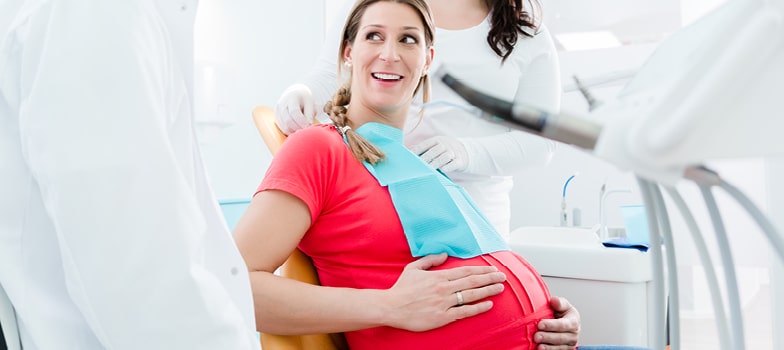Homepage » 12 doubts about oral health in pregnant women and baby

12 doubts about oral health in pregnant women and baby
Are you pregnant and would like to know what care you should take with your oral health during pregnancy? Clarify your doubts about these treatments and, later on, about the oral health of your baby.
1 – DOES PREGNANCY WEAKEN THE TEETH AND SO THERE IS A GREATER RISK OF CARIES?
No. During pregnancy, poor oral health conditions may worsen, but pregnancy does not, in itself, increase the incidence of caries.
2 – DURING PREGNANCY THE TEETH WEAKEN BECAUSE THERE IS A LOSS OF CALCIUM FOR THE BABY?
No. Calcium is present in the mother’s teeth in a stable and crystalline form and is not available for systemic circulation. Pregnancy does not increase the incidence of dental caries.
3 – DOES THE GUM BLEED MORE DURING PREGNANCY?
Yes, due to hormonal changes, the gums can easily hurt and bleed, and the situation worsens if there is no proper oral hygiene.
4 – IN CASE OF TOOTHACHE WHAT MEDICATION CAN BE TAKEN?
Don’t self-medicate. Pregnant woman should consult a dentist so that medication can be prescribed, or appropriate dental treatment carried out to resolve any painful situation.
5 – A PREGNANT WOMAN CAN HAVE ANY TYPE OF DENTAL TREATMENT?
Yes, even if you need anaesthetic. An oral infection is more harmful to the baby than dental treatment. Ideally, you should consult a dentist before pregnancy in order to avoid oral infections during this period. Appointments should be of short duration, preferably in the morning, with the second trimester of pregnancy being the most appropriate.
6 – HOW THE ORAL HYGIENE OF PREGNANT WOMEN CAN INFLUENCE THE HEALTH OF THE BABY?
Oral hygiene is the most effective preventive measure to avoid infections of the oral cavity. The mother can infect the baby with micro-organisms from infectious diseases such as dental caries and periodontal diseases.
7 – WHEN SHOULD CHILD ORAL HEALTH CARE BE STARTED?
It should start with prenatal advice to parents-to-be on the importance of maintaining good oral health. Children’s oral health care should be seen as the basis for preventive education that provides the normal conditions for optimal growth, development and functioning. Even before the teeth erupt, the baby’s gums must be cleaned with gauze moistened with water, at least once a day, preferably in the evening, as well as establishing correct feeding habits.

8 – WHAT IS THE IDEAL AGE FOR A BABY’S FIRST VISIT TO THE DENTIST?
The European and American Academy of Paediatric Dentistry recommend the first visit to the dentist by the first year of age. Ideally these visits serve to observe the state of the child’s oral health as well as to inform the parents about preventive attitudes, detect harmful habits (inappropriate use of feeding bottle, pacifiers), and establish an appropriate programme according to the baby’s degree of risk.
9 – HOW IMPORTANT ARE THE FIRST TEETH?
Temporary or milk teeth have several functions for the normal development of children, such as: aesthetics, chewing, maintaining space for permanent teeth, phonetics, influence on the growth of the jaws, breathing and swallowing. We must not forget that the last teeth to be replaced do not fall out until the age of 11-12 and, therefore, should carry out their functions correctly until then.
10 – “BABY TEETH” SHOULD BE TREATED”?
Yes, temporary teeth can be affected by caries just like permanent teeth. The characteristics of the first teeth mean that, once dental caries has started, they progress rapidly and affect the nerve tissue of the tooth more quickly than in permanent teeth. Avoiding the pain produced by caries is reason enough to preserve the health of children’s teeth, and we must also remember that caries is an infectious process, and can affect the formation of permanent teeth, as well as health in general.
11 – HOW SHOULD I ACT WHEN FACED WITH TRAUMATIC INJURIES TO “BABY TEETH”?
After a trauma, it is convenient to see a dentist immediately because early treatment minimises the risk of later complications. In the case of temporary teeth, these can directly affect the formation of permanent teeth (changing colour, direction of eruption, etc…). If a milk tooth is accidentally removed, you should not try to replace it as there is a risk of damaging the permanent tooth.
12 – WHEN DO THE FIRST TEETH ERUPT?
The eruption of teeth can cause some discomfort and symptoms such as increased salivation, anxiety, loss of appetite, or difficulty sleeping. Your dentist can give you some suggestions on how to relieve these symptoms. Some babies may be born with teeth (natal teeth) or, having teeth erupt during the first month of life (neonatal teeth). Usually the first “milk teeth” erupt between 6-8 months of age, and by the age of 2.5-3 years of age, 20 temporary teeth should appear in the child’s mouth, although slight individual variations can be considered completely normal.
